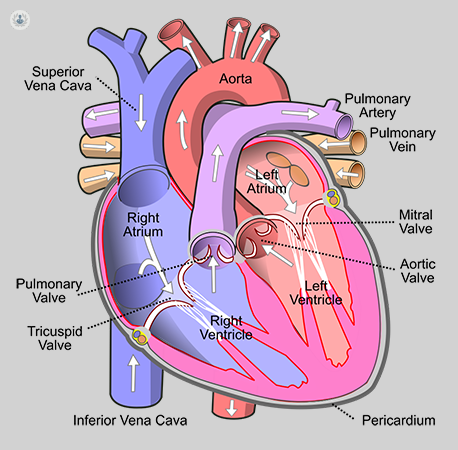How can heart disease be prevented?
Escrito por:In this article below, Professor Michael Papadakis, a revered consultant cardiologist, provides us with an all-you-need-to-know guide on heart disease.

How common is heart disease, and is it more common in women or men?
Heart disease affects around 7.4 million people in the UK. This number is almost double the number of people with other major conditions such as Alzheimer’s and cancer combined. Coronary heart disease, which is caused by narrowed or blocked arteries to the heart (coronary arteries), is one of the leading causes of death in the UK and the most common cause of death in individuals under the age of 75.
Heart disease is more common in men than women and men are affected at a younger age. However, it is important to highlight that there are around 800,000 women living with heart disease in the UK. Although women are more aware of conditions like breast cancer, coronary heart disease is overall a bigger risk as it kills more than twice as many women as breast cancer.
How can heart disease be prevented?
Here are some general tips of how best to avoid heart disease:
- Don’t smoke or use tobacco.
- Exercise for at least 30 minutes on most days of the week.
- Eat a heart-healthy diet that includes whole grains, lean protein, vegetables and fruits. Include your “5 a day” with at least five portions of a variety of vegetables and fruit, and do not forget to drink plenty of fluids (at least 6 to 8 glasses a day).
- Drink alcohol in moderation.
- Maintain a healthy weight.
- Manage stress.
- Get enough quality sleep.
- Go for regular health check-ups.
How much and what type of exercise do you have to do to boost heart health?
Exercise can reduce the burden of many physical and mental diseases including heart disease. It can reduce the burden of risk factors for heart disease such as high blood pressure, high cholesterol, diabetes, and obesity. It also has a beneficial effect in individuals who already have heart disease and can reduce the chances of the disease deteriorating, in some instances it has even improve their heart condition and importantly improve quality of life. Overall, exercise is associated with an additional two to seven years of life.
The general recommendation is to perform at least 150 minutes of moderate-intensity aerobic exercise or at least 75 minutes of vigorous-intensity aerobic physical activity throughout the week or an equivalent combination. However, it is important to note that some exercise is better than no exercise and exercising even for one to two hours per week can provide you with considerable heart benefits.
What is the link between fat in the diet and heart health?
Fat is essential for life. There is different kind of fat, including unsaturated fat, saturated fat, and trans-fats. In terms of your heart health, unsaturated fat is preferred to saturated fat, and both are better than trans-fat. However, recent studies have suggested that saturated fats may not be as bad as previously thought for your heart. Of course, no association with heart disease does not mean they are beneficial. The bottom line is if you balance your diet and replace saturated fats with unsaturated fats or wholegrains, this is likely to reduce your risk of heart disease.
Omega-6 fats have been associated with a lower risk of heart disease. Food sources for omega-6 fats include nuts, seeds and their oils including sunflower, sesame, canola and to a lesser extent olive oils. Nut butters are a better, ‘natural’ alternative to butter. As part of a balanced diet and when consumed in moderation, they provide unsaturated fats, minimally saturated fats but no trans-fat, and are linked to having a healthier heart.

Do eggs raise cholesterol?
Eggs have a bad reputation because the yolk is high in cholesterol. A medium-sized egg contains 186 mg of cholesterol, which is 62 per cent of the recommended daily intake. Cholesterol, however, is a bit more complicated than that as it plays an important function in our body and there are certain types that are beneficial for our heart health.
Is fibre good for heart health?
Fibre comes in two varieties: insoluble and soluble. Insoluble fibre is found in whole grains, wheat cereals, and vegetables. Soluble fibre sources include barley, oatmeal, beans, nuts, and fruits. Both types have been linked to heart health as fibre may lower blood pressure and cholesterol.
Does salt make a difference to your heart? If so, how much should we be aiming for per day, if any at all?
Salt is essential for life and it is present in almost all the food we eat. Eating too much can be bad for your heart as it predisposes to high blood pressure, which is a major risk factor for heart disease and stroke.
Vegetables and fruits contain very low amounts of naturally occurring salt. Manufactured foods may contain high amounts of salt as it is used to enhance the flavour or as a preservative. The recommended daily intake of salt for adults is less than six grams, which is less than a teaspoon a day.
Can stress increase your chances of heart disease?
Stress itself does not cause heart disease, but it turns people towards coping practices such as smoking, excessive alcohol drinking, comfort eating (which is typically high in fat and sugar) and being physically inactive, which in turn predisposes to risk factors for heart disease such as high blood pressure, high cholesterol, and diabetes.
How can sleep affect a potential onset of heart disease?
Getting enough quality sleep is important for your overall health, including your heart health. Lack of sleep can contribute to high blood pressure, which is a risk factor for heart disease.
Why do I need regular health checks?
Even if you are an individual who does all the “right” things in terms of your lifestyle, there is a significant genetic element to both risk factors such as high blood pressure, high cholesterol, and diabetes and developing heart disease. Moreover, high blood pressure and high cholesterol do not cause symptoms for most people and a heart attack or a debilitating stroke can be the first manifestation.
This is even more important to consider if you have family members who had heart disease at a young age (< 50 years). As such it is important to consider a health check which can identify or predict your future risk of heart disease. In addition to the lifestyle changes mentioned above, the use of medications and medical procedures can help manage established heart disease or reduce the risk of developing heart disease. If you have heart disease or are at risk for it, it’s important to work with your doctor to develop a plan that’s right for you.
To book an appointment with Professor Michael Papadakis today, visit his Top Doctors profile.


